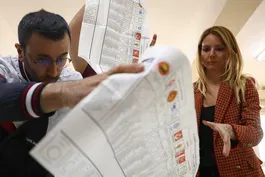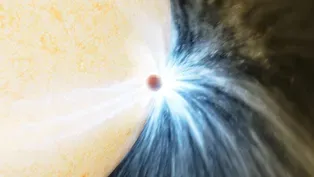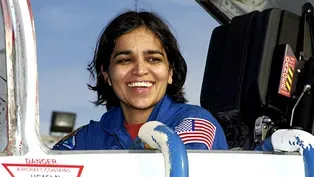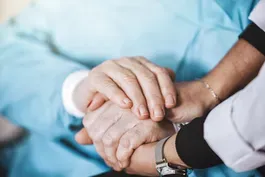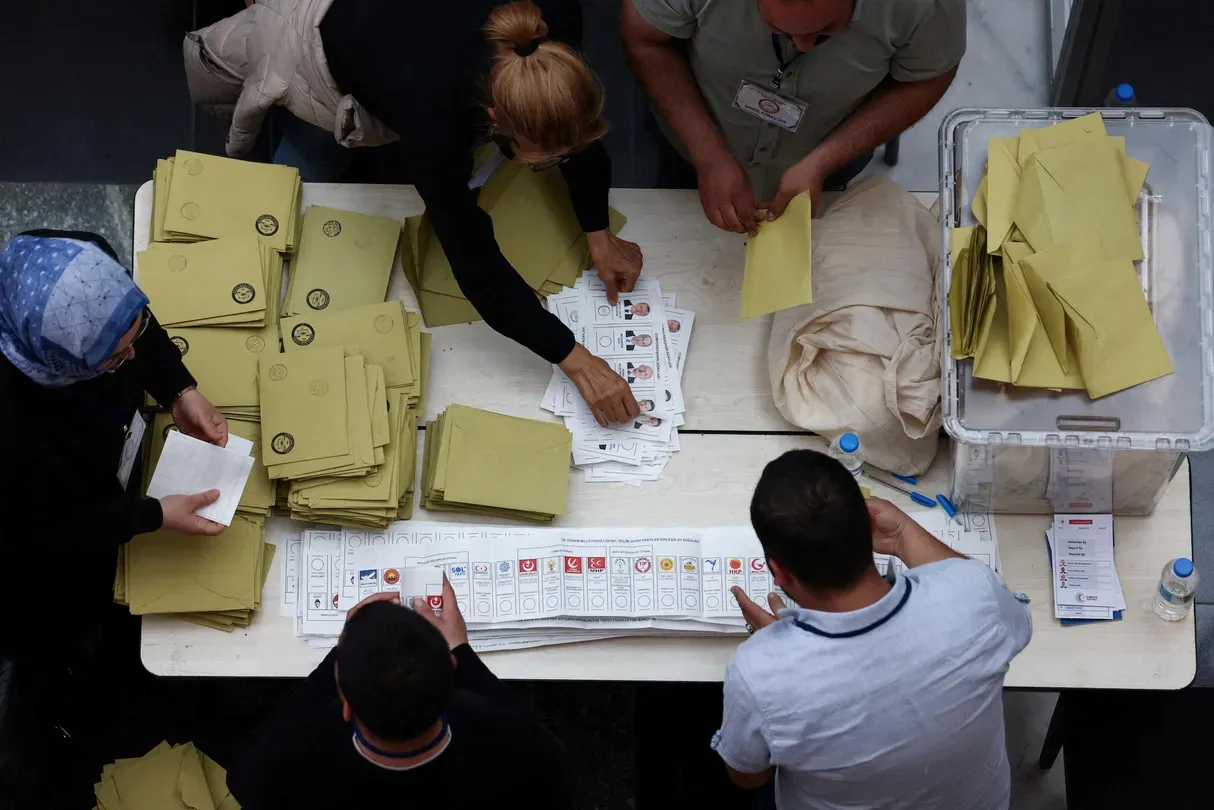

May 14, 2023 - PBS News Weekend full episode
5/14/2023 | 26m 45sVideo has Closed Captions
May 14, 2023 - PBS News Weekend full episode
Sunday on PBS News Weekend, Turkey votes for their next leader as the world waits to see if President Erdogan holds on to power. Then, a look at the misdiagnosis and unequal treatment of women with Parkinson’s disease. We examine some never-before-seen celestial events thrilling scientists. Plus, the story of the first Indian American astronaut, who gave her life exploring space.
Problems with Closed Captions? Closed Captioning Feedback
Problems with Closed Captions? Closed Captioning Feedback
Major corporate funding for the PBS News Hour is provided by BDO, BNSF, Consumer Cellular, American Cruise Lines, and Raymond James. Funding for the PBS NewsHour Weekend is provided by...

May 14, 2023 - PBS News Weekend full episode
5/14/2023 | 26m 45sVideo has Closed Captions
Sunday on PBS News Weekend, Turkey votes for their next leader as the world waits to see if President Erdogan holds on to power. Then, a look at the misdiagnosis and unequal treatment of women with Parkinson’s disease. We examine some never-before-seen celestial events thrilling scientists. Plus, the story of the first Indian American astronaut, who gave her life exploring space.
Problems with Closed Captions? Closed Captioning Feedback
How to Watch PBS News Hour
PBS News Hour is available to stream on pbs.org and the free PBS App, available on iPhone, Apple TV, Android TV, Android smartphones, Amazon Fire TV, Amazon Fire Tablet, Roku, Samsung Smart TV, and Vizio.
Providing Support for PBS.org
Learn Moreabout PBS online sponsorshipJOHN YANG: Tonight on "PBS News Weekend," Turkey votes to pick their next leader as the world waits to see if President Erdogan can hold on after two decades in power, then a look at the misdiagnosis and unequal treatment of women with Parkinsonús disease.
And some never before seen celestial events, thrilling scientists and space enthusiast alike.
MAN: Itús a reminder that we are pretty insignificant in the grand scheme of things.
And yet, weúve gotten pretty smart at figuring some big things out.
(BREAK) JOHN YANG: Good evening, Iúm John Yang.
In Turkey, officials are counting the votes from todayús election to see a President Recep Tayyip Erdogan will continue his two decade hold on power.
The state run news agency indicates that Erdogan may be headed for a runoff in two weeks.
The election with a unified opposition represented the greatest political challenge yet to Erdoganús increasingly authoritarian rule.
The Challenger Kemal Kilicdaroglu narrowly led Erdogan in pre-election surveys.
Heús a retired civil servant and ran on the promise of restoring democracy which Erdogan had eroded.
Some Turkish voters went to the polls today in mood for change.
MURAT KACMAZ, Ankara Resident (through translator): For me, this feels like a parting of ways I donút know how to describe it.
I canút think of a more important election.
JOHN YANG: While we await the final vote count we turn to Soner Cagaptay, whoús head of the Turkish research program at the Washington Institute for Near East Policy.
His most recent book is "A Sultan in Autumn: Erdogan Faces Turkeyús Uncontainable Forces."
To use your terms, what are the uncontainable forces that are driving her to want to run off tonight?
SONER CAGAPTAY, THE WASHINGTON INSTITUTE FOR NEAR EAST POLICY: I would say that economy is his Achilles heel Iran has won elections until recently on a platform was slowing economic growth.
And heús never won elections while not delivering growth.
At the same time, he came pretty close to clinching victory this time.
So, economy was a big factor going in to the elections for him and the earthquake should have hurt his popularity.
Aid agencies were nowhere to deliver aid after this devastating and sad earthquake.
But his strength is his information control or control over information flow rather.
In the last half a decade, Erdogan has eliminated autonomy of many of Turkeyús institutions, from courts to foreign ministry to the central bank, with grave ramifications for countryús economy foreign policy, but also electoral boards and media.
90 percent of the media is aligned with them and 80 percent of Turkeys citizens cannot read languages other than Turkish.
So you can curate reality.
And in the run up to these elections, citizens did not hear about inflation, human rights abuses, journalists and politicians in jail or relief agencies that failed to provide aid after the earthquake.
But how Erdogan has made Turkey a great military industrial power.
He repeated this argument over and over in the media, given that a large majority of citizens basically read the news that he curated.
So I think this is the first election won in the world, Erdogan being the inventor of nativist populist politics in this century globally, the first election won on a platform of post truth narrative, meaning you spread lies, you repeat them so much that they become reality, and you win elections based on that.
And people forgot that these lives to begin with.
JOHN YANG: This election is being closely watched in western capitals, here in Washington and at the Kremlin.
Why -- whatús it stake for those parties?
SONER CAGAPTAY: A lot is at stake.
Turkey is a second largest military, NATO, it borders Iran, Iraq, Syria.
It plays a role in the war in Ukraine.
Vladimir Putin decided last year that he wanted Erdogan want to win.
As the economy in Turkey went into problems and hyperinflation under Erdoganús large amounts of cash was transferred from Russia to Turkey, Erdogan handed these out in the form of very generous social security benefits, as well as cheap natural gas from Russia that he basically gave free to voters in the run up to elections.
And I think that helped perhaps put him close to the finishing line.
Putin wants Erdogan to win because Erdogan is like-minded leader that helps Putin challenge the U.S. led liberal international order.
So I think Putin is quite happy tonight that Erdogan did not lose.
We have a runoff likely in two weeks, and Putin will continue to support Erdogan financially and through information operations, because he cannot afford to see Erdogan lose when heús not winning himself in Ukraine.
JOHN YANG: And tell us about the opponent heús going to face in the runoff Kilicdaroglu.
How much of his strength tonight is support for him how much is an opposition to Erdogan?
SONER CAGAPTAY: Absolutely, Kilicdaroglu is a soft spoken politician opposite of Erdogan.
Erdogan is a populace.
He demonizes and brutalizes and cracks down on demographics unlikely to vote for him.
Kilicdaroglu follow the campaign where he reached out across the aisle, tried to bridge Turkey traditional left, right split him being on the left side, of course.
And perhaps it worked.
He was able to unite opposition forces, but he couldnút really get to, I think the 50 percent margin.
And in this regard, I think Erdogan played a really masterful game.
Kilicdarogluús party was supported by a pro-Kurdish faction.
Erdogan branded this faction as quote unquote, terrorists.
And as I said, post truth narrative.
If you repeat a lie enough, many times it becomes reality.
I think some voters were convinced that support for Kilicdarogluús opposition Kurdish party meant support by terrorists factions, and he probably lost some support as a result of that.
JOHN YANG: If Erdogan wins the runoff or if it goes to the runoff, and Erdogan wins the runoff.
Do you think his assault on democracy will continue?
SONER CAGAPTAY: I have so far argue that Turkey is, you know, countries could be vegetables.
Iúve said that Turkey is the onion, why?
The analytically onion because it doesnút have a core.
You peel it you think you got to the core and itús not there.
So taking that analogy, (INAUDIBLE) argued that Turkey is not an autocracy, not a democracy.
It is a democracy that has fallen under an autocrat.
Itús trying to make a comeback.
It didnút succeed quiet will seem to run off what happens.
If Erdogan wins again, I think Turkey will become a complete autocracy.
The remaining institutions that have maintained their autonomy will fold under him, the few courts and others.
The last vestiges of rule of law will disappear.
Erdogan wall will become a anointed as the countryús new sultan, educated Turks and youth will flee the country having up any given up any hope that lost hope that he can be voted out.
And I think that unfortunately, Turkey will descend into deeper autocracy.
JOHN YANG: Soner Cagaptay, thank you very much.
SONER CAGAPTAY: Itús my pleasure, thank you.
JOHN YANG: Elsewhere, tropical cyclone Mocha made landfall over Myanmar today battering the coast with heavy rain and winds up to 130 miles an hour.
The storm lashed the sprawling Rohingya refugee camps in Bangladesh, but the country was spared a direct hit.
So far, officials report three casualties all in Myanmar to the east.
In recent days, hundreds of thousands of people in Myanmar and Bangladesh will move to safer areas and sturdier structures.
Ukrainian president Volodymyr Zelenskyy has diplomatic tour of European allies took them to Berlin today.
He told reporters there that the goal of a plan counteroffensive is to drive Russian forces out of Ukrainian territory they occupy not to attack Russia.
He spoke at a news conference with German Chancellor Olaf Scholz and disputed a report that said leaked U.S. intelligence documents suggested he considered trying to capture Russian territory as bargaining chips in peace talks.
VOLODYMYR ZELENSKYY, Ukrainian President (through translator): We do not attack Russian territory.
We liberate our lawful land.
We are not interested in this.
We donút have time for this.
We donút have powers for this.
JOHN YANG: Zelenskyy also already arrived at his next stop Paris for talks with French president Emmanuel Macron.
And Homeland Security Secretary Alejandro Mayorkas said today, the number of people crossing the Mexico border illegally was cut in half since the pandemic era immigration policy known as Title 42 ended at midnight Thursday.
Mayorkas said Border Patrol agents encountered more than 10,000 people entering the country illegally in the days leading up to Title 42 is expiration.
But on Friday, there were just over 6, 000 and just over 4000 on Saturday.
Illegal border crossings remain higher than in previous months and remain well above the lows (ph) during the pandemic.
Still to come on "PBS News Weekend," the celestial events thrilling space scientist and enthusiast, and the story of the first Indian American astronaut who gave her life exploring space.
(BREAK) JOHN YANG: After Alzheimerús disease, Parkinsonús is the second most common neurodegenerative disorder in the United States.
Itús a diagnosis nearly 90,000 Americans get every year.
But as Ali Rogin tells us it exhibits its symptoms differently in women than in men.
ALI ROGIN: Parkinsonús disease damages or kills nerves in the brain, causing muscle stiffness, tremors and other symptoms that worsen over time.
And while itús more common in men than women, women are more often misdiagnosed or diagnosed late, and sometimes women experience symptoms and respond to treatment differently than men.
Joining me to discuss is Sonia Mathur, a Parkinsonús disease advocate and family physician.
Dr. Mathur, thank you so much for joining us.
As youúve described it to me, Parkinsonús disease is really more of a spectrum of neurodegenerative disorders more than any one ailment.
So with the understanding that itús not a monolith, can you describe what some of the most common symptoms of Parkinsonús disease are?
SONIA MATHUR, Parkinsonús Disease Advocate: Parkinsonús disease is the second most common neurological disease behind dementia, but itús the fastest growing of neurological illnesses.
And as you mentioned, is neurodegenerative progressive, relentless without a cure.
And the symptoms can sort of be divided into two groups and the motor symptoms.
Those are things like tremor, and slowness of movement and stiffness and false.
Non-motor symptoms can be anything from head to toe, including parents skin changes, fatigue, sleep issues, constipation, a variety of symptoms.
ALI ROGIN: How is it that men and women experienced these symptoms differently?
SONIA MATHUR: Women are more charmer dominant, we have more facial masking and more restless leg syndrome.
When it comes to non-motor symptoms, we tend to suffer more from mood issues such as anxiety and depression and sleep disturbances compared to our male counterparts.
We also experienced more fatigue, pain and your genital symptoms such as urinary dysfunction and incontinence.
And whatús even more that we know that the severity impact of these symptoms varies according to the hormonal status of the woman, for example, throughout her menstrual cycle or with menopause, for example.
We believe that the longer that youúre exposed to estrogen through your life that that may help to prevent or to protect you from getting something like Parkinsonús disease.
We just donút have the answers.
Historically, most research participants were white older gentleman, so a lot of our treatment guidelines that came from that research, were based on a result of a small set of population thatús actually affected by this disease, because the stereotype is still there today that it affects why older gentleman is opposed to the fact that this disease really knows no boundaries in terms of age, gender, race, geographical borders.
ALI ROGIN: And you yourself were diagnosed with whatús known as young onset Parkinsonús at age 28.
What was that experience like for you getting diagnosed?
And how did you come to understand that thatús what you had?
SONIA MATHUR: I basically noticed an intermittent tremor and my right pinky finger.
And I just completed my residency in family medicine was expecting my first daughter, and my husband, whoús also a physician said I had better go get checked out.
And instead of getting the news that I had hoped, I was diagnosed with young onset Parkinsonús disease at the age of 28.
And that was almost 24 years ago.
And the disease continued to progress.
So much so that I had to actually stop my clinical medical practice, unfortunately, and said, devoted my life to words advocacy, educational research in Parkinsonús disease.
The impact of this disease is really extremely disabling effects, not only physically, but mentally, socially, emotionally, relationships get affected, and itús pretty unpredictable in terms of its disability.
Your symptoms and response to medication can really vary day by day, hour by hour, and thatús sort of what Iúm experiencing now as well.
ALI ROGI: And speaking of that unpredictability, are there any symptoms any changes that women should look out for if they think potentially they may be experiencing Parkinsonús disease symptoms?
SONIA MATHUR: The issue with young onset Parkinsonús disease in general and women in particular, is that we often present with nonspecific symptoms.
Mine was a little bit unusual in that I had a tremor right away.
A lot of women or men for that matter and young onset Parkinsonús will present with you know, shoulder pain or slowness of movement, not swaying their arm, loss of smell, constipation, depression, what we call REM sleep behavior disorder, which is acting out your dreams and moving during sleep.
The other problem with diagnosing women or our men in this younger age is the fact that not only its symptoms nonspecific but that physicians also are not in the mindset that this happens in younger people.
Theyúre still on the lookout for it and older people and particularly men.
ALI ROGIN: And to that point, are there any advancements in the study of this that give you hope?
SONIA MATHUR: Itús definitely improving.
Researchers are much more aware of the need to include underrepresented populations in general in their work.
And we need to do research that are inclusive of women and our unique genetics, our unique hormonal status.
The research that is out there currently is lacking in these areas.
For example, I mentioned that we think that there may be neuroprotective role for estrogen when it comes to the timing of estrogen exposure.
When is it best to start something of hormone replacement therapy?
What type of hormone replacement therapy and how long?
What about oral contraceptive pills?
We know that women report that their Parkinsonús symptoms tend to get worse just prior to menstruation sometimes during it as well.
What is the best way to manage those fluctuations?
Thatús something we donút know yet.
How does pregnancy affect the trajectory or progression of your Parkinsonús or does it?
Thereús so many unanswered questions that affect women uniquely.
And I want to always stress that type of research is not only just important for women but can benefit the whole Parkinsonús community because it increases our general understanding or knowledge of this disease, which will benefit everybody itús really a win-win situation.
ALI ROGIN: Dr. Sonia Mathur, family physician and Parkinsonús disease advocate, thank you so much for joining us.
SONIA MATHUR: Thank you so much for having me.
JOHN YANG: Itús been an exciting time for astronomers, astrophysicist and other scientists who specialized in the goings on in the far reaches of space.
Since the beginning of the month observations of some never before seen celestial events have been reported in science journals.
Science correspondent Miles OúBrien is here to explain all.
Miles, thanks for joining us.
The first one is a star swallowing up a planet that was orbiting around it.
And as you talk about, weúre going to show some animation from Caltech depicting, MILES OúBRIEN: Well, John, I donút want to ruin your weekend.
But this is in fact a preview of what lies ahead for our little planet Earth.
A team of researchers at Palomar Observatory outside San Diego, were using a Wide Field Camera called the Zwicky Transient Facility, which looks at a big swath of the night sky looking for things like comets and asteroids.
Astronomer Kishalay De at MIT, is going through data from 2020.
Thereús so much data that they have a backlog, and he noticed a star about 12,000 light years away that grew 100 times brighter over the course of a week.
He thought maybe that was a binary star, which he studied quite a bit two stars, which kind of interact with each other.
And their brightness changes as the gravity pushes in polls.
But the problem was the total amount of energy that was released by this event was way less than it would be if it was two stars.
And so that meant by virtue of that, that it was probably a black hole swallowing up a planet, but itús not just any planet 10 times bigger than Jupiter.
And I guess the flash that he saw, I guess it amounts to a Cosmic Belt, John.
JOHN YANG: You say this is going to happen to earth.
Does this happen to all planets?
Do they eventually sort of go into their sons?
MILES OúBRIEN: Not all of them I gather planets in our solar system are likely to be spared.
And weúre kind of on the bubble.
We know Venus and Mercury theyúre goners eventually.
Thereús some scientific debate as to what will happen to us.
But basically, the star gets bigger and bigger as it gets older, like we all do, I suppose, and gets hotter, and eventually gobbles up the near planet.
So Iúm sorry to give that piece of news to everybody here this weekend.
But we have some time to plan.
JOHN YANG: Youúve given us a lot of lead time.
The next thing I want to ask you about is the largest space explosion ever detected.
MILES OúBRIEN: This one is very far away 8 billion light years away.
So that means what weúre seeing in these images or animations, or data is at about 6 billion years after the creation of the universe, the Big Bang.
This explosion lasted about three years.
So what was it?
No oneús really sure.
The current thinking is that maybe the black hole in this case, much more powerful than ours swallowed up a huge gas cloud and in so doing created this multi-year explosion.
So again, the universe is rough place, John.
JOHN YANG: Tough neighborhood.
Thereús also a neutron star that is behaving in a way that scientists didnút think a star could behave.
And first of all, start off by telling us what a neutron star is.
MILES OúBRIEN: Itús like a dead star didnút quite make it to black hole status.
But a neutron star is very, very dense object.
There are limits to how bright they can become.
Itús called the Eddington limit, little bit of physics here, but basically, itús a push and pull between the light photons and gravity.
And the physicists would tell you that given the size of any particular object, thereús a limit to how bright it can be.
But this one turns out is 100 to 500 times brighter beyond this so called Eddington limit.
And they think whatús happening here is that the magnetic field at this particular neutron star is actually warping the atoms and allowing that star to hold together longer than it would otherwise.
So thatús a little bit mind-bending and actually literally add embedding.
But there you have it.
JOHN YANG: This is all mind-bending to me.
The closest instance of a black hole tearing apart a star, remind us or describe what a black hole is.
And weúll play some animation from NASA.
MILES OúBRIEN: Yeah, these are huge gravity wells that are at the center of most galaxies is one of the center of ours.
This one, they say close in astronomical terms, itús 137 million light years away from Earth.
And we know about these tidal disruption events, which create this thing, what my favorite astronomical term spaghettification, it pulls things in so rapidly that they stretch out spaghetti style.
And this was the closest one weúve seen.
But as you look at this animation that NASA made for us, this is all a reminder of number one, how far science has taken us to even understand all of this.
And the fact that we know this all exists.
We have the Webb Space Telescope giving us great imagery.
We have the Vera Rubin Observatory in Chile coming online soon, all kinds of instruments, which are going to take us even farther and further back in time.
And, you know, to me, John, itús a reminder that we are pretty insignificant in the grand scheme of things.
And yet, weúve gotten pretty smart at figuring some big things out.
So, as we face our problems here on Earth, we do have the capability of understanding big things.
And maybe thatús something we can take in our daily lives to help us understand how we solve smaller problems right here on Earth.
Thatús my philosophical note for the weekend.
JOHN YANG: We appreciate it, Miles.
This has been fascinating.
Our own -- very own master the universe, Miles OúBrien.
Thank you very much.
MILES OúBRIEN: John, itús a pleasure.
JOHN YANG: Finally, tonight, our Hidden History series, we explore the legacy of the first Indian American astronaut who gave her life the name of research, science and exploration.
MAN: Dr. Kalpana Chawla, also a rookie Mission Specialist.
JOHN YANG: In 1997, Kalpana Chawla realized her lifelong dream of traveling to space.
She was the first American of Indian descent to accomplish that feat.
Once it all seemed unimaginable.
KAPLANA CHAWLA, First Indian-American Astronaut: For me, it was very far-fetched to think I get to fly on the space shuttle because I lived in India in a very small town.
And forget about space.
I didnút even know if my folks were going to let me go to the engineering college.
JOHN YANG: She did get an aerospace engineering degree from Punjab engineering college in India, and a PhD from the University of Colorado Boulder.
In 1994, she was one of the 20 applicants accepted in NASAús astronaut program out of a pool of nearly 4,000.
She was assigned to the shuttle Columbia as a mission specialist and prime robotic arm operator.
On her first mission, Chawla used the arm to deploy a research satellite.
It was intended to study the sun but malfunctioned.
On her second mission, she oversaw research on the impact of low gravity, ranging from crystal growth to cancer.
But on the return to Earth on February 1, 2003, just minutes before it was to land in Florida, the Columbia disintegrated, killing the entire crew.
NASA suspended space flights for two years while it investigated the disaster which was blamed on damage the shuttle suffered at liftoff.
In India, there were shock and horror.
Many said tearful prayers at Chawlaús hometown of Karnal.
MAN: And lift off.
The SS Kaplana Chawla takes flight sights set on the International Space Station.
JOHN YANG: In 2020, NASA launched a commercial spacecraft named after the modest but determined woman who pursued her passion inspired others and contributed to the cutting edge of science.
And that is "PBS News Weekend" for this Sunday.
Iúm John Yang.
For all of my colleagues, thanks for joining us.
Happy Motherús Day.
Erdogan’s control hangs in the balance in Turkey’s election
Video has Closed Captions
Clip: 5/14/2023 | 6m 11s | The significance of Turkey’s election as Erdogan’s control hangs in the balance (6m 11s)
A look at celestial events thrilling scientists this month
Video has Closed Captions
Clip: 5/14/2023 | 6m 5s | A closer look at the novel celestial events thrilling scientists this month (6m 5s)
Remembering Kalpana Chawla, first Indian American in space
Video has Closed Captions
Clip: 5/14/2023 | 2m 22s | Remembering Kalpana Chawla, the first Indian American to go to space (2m 22s)
Why many women with Parkinson’s are misdiagnosed
Video has Closed Captions
Clip: 5/14/2023 | 6m 19s | Why women with Parkinson’s are misdiagnosed more often than men (6m 19s)
Providing Support for PBS.org
Learn Moreabout PBS online sponsorshipSupport for PBS provided by:
Major corporate funding for the PBS News Hour is provided by BDO, BNSF, Consumer Cellular, American Cruise Lines, and Raymond James. Funding for the PBS NewsHour Weekend is provided by...
